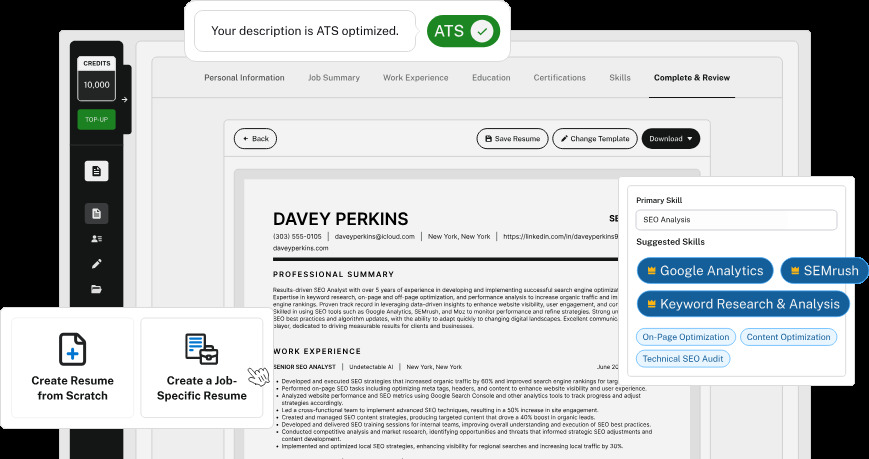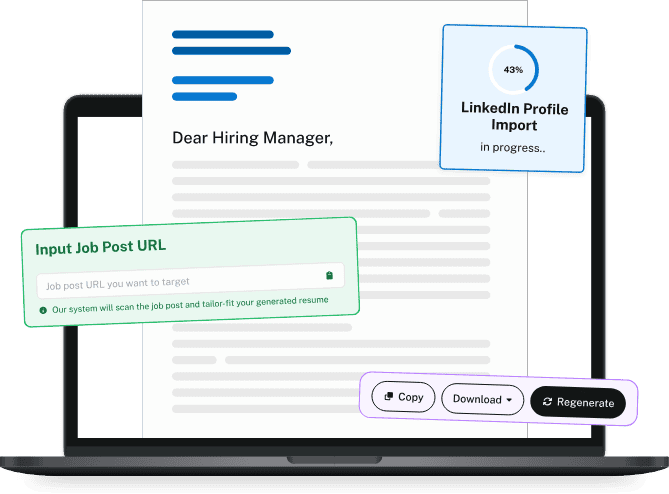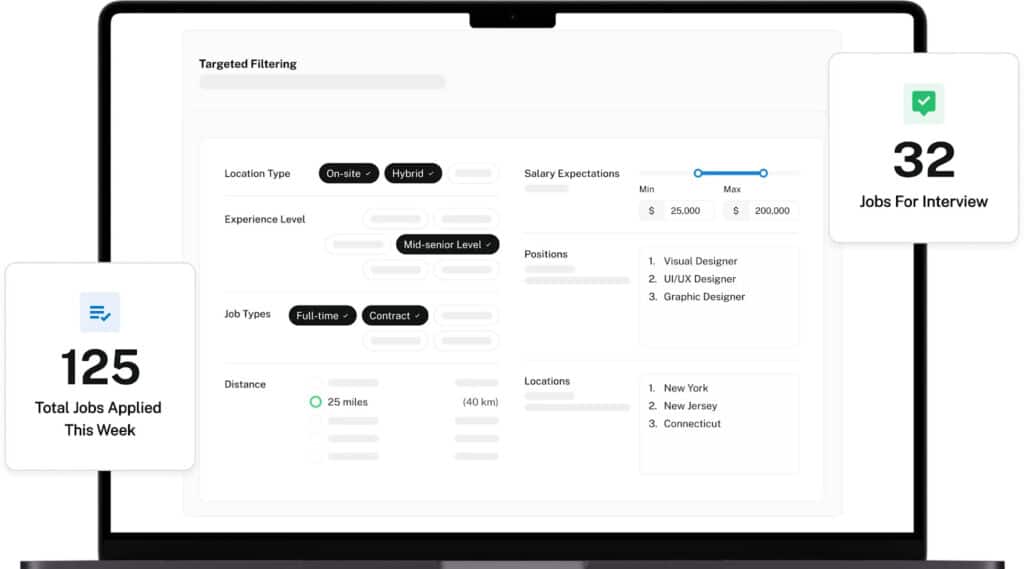The shift in the global job market for the past decade has been fast and chaotic.
From the rise of crypto to AI development and work-from-home job setups, many jobs that didn’t even exist a decade ago are now pulling in a six-figure income.
We’re not just talking about our Silicon Valley tech workers, either.
The massive change and abrupt demand for these high-paying jobs have impacted many industries.
So, how can you actually get into these jobs? Or better yet, what exactly are the top-earning gigs out there?
There’s a chance that you can earn yourself one of these lucrative positions, as long as you have the right skill set and credentials.
But most importantly, you need a strategy.
We’ll guide you through it all, with less fluff, more facts, and maybe a little envy.
What Defines a High-Paying Job?
When we talk about high-paying jobs, we’re typically referring to positions with annual salaries significantly above the national average.
In the United States, the median annual wage hovers around $79,050, according to recent Bureau of Labor Statistics data.
High-paying jobs generally offer at least double this figure, with top-tier positions commanding salaries well into the six and even seven-figure range.


Never Worry About AI Detecting Your Texts Again. Undetectable AI Can Help You:
- Make your AI assisted writing appear human-like.
- Bypass all major AI detection tools with just one click.
- Use AI safely and confidently in school and work.
However, raw salary numbers only tell part of the story.
Truly high-paying positions often come with additional financial benefits:
- Comprehensive healthcare coverage
- Substantial retirement contributions
- Performance bonuses and profit sharing
- Stock options and equity packages
- Paid time off and sabbatical opportunities
- Education reimbursement and professional development funding
The most financially rewarding careers typically require significant investments of time, energy, and education.
Medical specialists may spend over a decade in training. Corporate executives often work 60+ hour weeks.
Technical professionals must constantly update their skills to stay relevant.
These trade-offs highlight an important truth: high pay generally correlates with specialized expertise, significant responsibility, or both.
Demand vs. Salary: Why Some Jobs Pay More
Why do some jobs command astronomical salaries while others with similar education requirements offer modest compensation?
The answer lies in the fundamental economic principle of supply and demand.
Jobs pay more when:
- They require rare skills or talents that few people possess
- They involve high levels of risk or stress
- They demand extensive education or specialized training
- They create exceptional value for employers or clients
- They operate in industries experiencing faster growth
Take neurosurgeons, for example.
The combination of extremely specialized skills, years of intensive training, high-stakes decision-making, and life-or-death responsibility creates the perfect conditions for premium compensation.
Similarly, AI research scientists command high salaries because they possess cutting-edge technical skills in a rapidly expanding field where demand far outstrips the available talent pool.
Understanding these dynamics can help you strategically position yourself in high-demand, high-compensation career paths.
Top 10 Highest Paying Jobs in the World
Ready to explore the upper echelons of the salary spectrum? These professions consistently rank among the world’s highest-paying careers.
While specific salaries vary by location, experience, and employer, these roles typically offer exceptional compensation packages.
1. Cardiologists, Neurosurgeons, and Specialized Medical Doctors
Average Salary Range: $350,000 – $700,000+
Medical specialists who treat complex conditions affecting vital organs command the highest salaries in healthcare.
Neurosurgeons performing delicate brain operations and cardiologists treating life-threatening heart conditions require extensive training—typically 12-15 years, including medical school, residency, and fellowship.
The combination of specialized expertise, high-pressure decision-making, and irregular hours justifies their premium compensation.
2. Chief Executive Officers (CEOs)
Average Salary Range: $900,000 (median)
Leading major organizations requires exceptional strategic vision, leadership abilities, and business acumen.
While base salaries for CEOs are substantial, the bulk of their compensation often comes through performance bonuses, stock options, and other equity-based incentives.
This compensation structure ties their earnings directly to company performance, creating the potential for astronomical payouts when businesses thrive.
3. Investment Bankers (Managing Directors)
Average Salary Range: $300,000 – $600,00
At senior levels, investment bankers who facilitate major financial transactions earn exceptional compensation.
Their ability to structure complex deals, raise capital, and manage mergers and acquisitions directly impacts their clients’ financial outcomes.
The pressure-cooker environment and demanding hours contribute to the premium pay scale, with bonuses often exceeding base salaries many times over.
4. Data Scientists and AI Research Scientists
Average Salary Range: $108,000 – $500,000+
As artificial intelligence transforms industries, experts who can develop cutting-edge AI systems command increasingly impressive salaries.
Top AI researchers at companies like Google, Meta, and OpenAI often earn compensation packages comparable to those of C-suite executives.
Their ability to solve complex problems using machine learning creates tangible business value worth millions or billions to their employers.
5. Blockchain Developers and Cryptocurrency Experts
Average Salary Range: $150,000 – $175,000+
The rapid expansion of blockchain technology and digital currencies has created a high-demand, low-supply situation for developers with specialized distributed ledger expertise.
Companies building financial platforms, smart contract systems, and decentralized applications compete fiercely for this talent, driving compensation packages to impressive heights.
6. Corporate Lawyers and Partners at Top Law Firms
Average Salary Range: $1,500,000
Attorneys who achieve partnerships at prestigious law firms or specialize in high-stakes corporate law can earn seven-figure incomes.
Their expertise in navigating complex legal terrain helps clients protect assets worth billions.
The combination of advanced education, specialized knowledge, and high-pressure stakes creates the perfect environment for premium compensation.
7. Airline Pilots (Experienced Captains)
Average Salary Range: $150,000 – $350,000+
Flying commercial aircraft combines tremendous responsibility with specialized technical skills.
Experienced captains at major airlines earn substantial salaries after working their way up through years of training and flying hours.
The responsibility for hundreds of lives and expensive equipment, combined with irregular schedules and time away from home, contributes to their high compensation.
8. Petroleum Engineers
Average Salary Range: $130,000 (median)
Engineers who discover and develop methods for extracting oil and gas earn exceptional salaries, particularly when working in challenging environments like offshore platforms.
Their specialized knowledge directly impacts the profitability of energy companies, creating strong incentives for competitive compensation.
9. Orthodontists and Oral Surgeons
Average Salary Range: $240,000 (median)
Dental specialists who correct alignment issues or perform complex oral surgeries command premium fees for their services.
The combination of specialized expertise, direct patient interaction, and the ability to own and operate their practices creates significant earning potential.
10. Financial Managers and Chief Financial Officers (CFOs)
Average Salary Range: $150,000 – $3 million+
Executives who oversee an organization’s financial health make critical decisions that directly impact profitability.
Their ability to manage risk, optimize cash flow, and guide financial strategy justifies their substantial compensation, particularly in large corporations where financial decisions involve billions of dollars.
This list represents just a snapshot of high-paying career options.
Other lucrative fields include specialized areas of engineering, certain medical specialties like plastic surgery and radiology, quantitative finance, and enterprise sales for major technology companies.
How to Get a High-Paying Job
Securing one of these premium positions isn’t simply a matter of desire—it requires strategic planning, sustained effort, and smart positioning.
Here’s your roadmap to landing a top-paying role.
1. Choose a Career Path With High Earning Potential
Your career journey begins with selecting a path that aligns both with your interests and with market realities.
Consider these factors:
- Industry growth prospects: Fields like healthcare, technology, and renewable energy show strong projected demand
- Specialization opportunities: Roles requiring specialized expertise typically command higher salaries
- Education requirements vs. return on investment: Some high-paying careers require extensive (and expensive) education—ensure the long-term financial benefits justify the initial investment
- Your natural aptitudes and interests: Sustainable success requires genuine engagement with your work
Remember that a high-paying job you hate is ultimately less valuable than a well-compensated role you find fulfilling.
The sweet spot combines strong earning potential with work that engages your talents and interests.
2. Build a Strong Resume & Cover Letter
Landing interviews for premium positions requires marketing yourself effectively through polished application materials.

Undetectable AI’s Resume Builder flips the script on traditional applications.
With just a few clicks, you can create a sleek, ATS-optimized resume tailored to each job you’re applying for.
Whether you’re a marketing manager, SEO analyst, or graphic designer, the builder automatically pulls in industry-specific keywords and phrases that hiring systems and recruiters are scanning for.
And if you’re in a rush? You can even import your LinkedIn profile to save time.

On the other side of the application stack, the AI Cover Letter Generator does the heavy lifting of writing thoughtful, personalized letters for every role.
Instead of reusing the same dry intro and closing, it analyzes the job posting and crafts a custom letter that aligns with your experience, tone, and goals, making it clear why you are the right fit.
You can edit the result, customize the layout, and download a final version that looks like it took hours (but didn’t).
Together, these tools give you an advantage in a competitive job market—saving you time, boosting your confidence, and making sure your first impression is unforgettable.
3. Apply to High-Paying Jobs Efficiently
Job searching is often a numbers game, but strategic applications yield better results than random submissions.

Undetectable AI Job Application Bot transforms this process by automating much of the repetitive work while maintaining personalization.
This advanced AI tool doesn’t just search and apply for jobs en masse. It identifies high-paying roles that fit your skills, personalizes each application, and sends them out while you sleep. Literally.
Here’s how it works:
- Instant Resume Upload – Upload your resume or connect LinkedIn, and the AI gets to work customizing each application.
- Targeted Search Filters – Define the roles, industries, and locations you want. The AI scans multiple platforms to find the best-fitting, highest-paying opportunities.
- One-Click Auto Apply – Once set, the AI sends out optimized, customized applications—each one tailored to pass ATS filters and catch recruiter attention.
- Real-Time Updates – Get notified when an employer shows interest so you can jump on interviews fast.
It’s job hunting at scale but without the chaos. No more wasting hours on job boards, repeating the same info, or burning out.
4. Gain Specialized Skills & Certifications
High compensation correlates strongly with specialized expertise.
Continuous skill development isn’t optional for those seeking premium positions but rather essential.
Consider these approaches to building valuable expertise:
- Pursue advanced degrees in high-demand fields: MBAs from prestigious programs, specialized master’s degrees, and doctoral qualifications can open doors to premium compensation
- Obtain industry-recognized certifications: Credentials like the CFA (Chartered Financial Analyst), PMP (Project Management Professional), or specialized technical certifications demonstrate verified expertise
- Develop complementary skill sets: Combining technical knowledge with business acumen or technical expertise with management capabilities creates particularly valuable professional profiles
- Stay current through continuous learning: Regular participation in professional development ensures your skills remain relevant in hyper-evolving fields
The most valuable skills often sit at the intersection of multiple domains, like data science and healthcare, finance and sustainability, or technical expertise and communication abilities, for example.
5. Network With Industry Professionals
Who you know often determines which opportunities you discover.
Professional networking is about building genuine relationships within your target industry.
Effective networking strategies include:
- Attending industry conferences and events: These gatherings provide opportunities to meet potential mentors, employers, and peers.
- Participating in professional associations: Industry groups often provide both educational resources and networking opportunities.
- Engaging thoughtfully on professional platforms: Sharing insights and engaging with industry content helps establish your expertise.
- Finding mentors in your target field: Guidance from established professionals can provide invaluable insider knowledge.
- Building relationships before you need them: The best networking happens when you’re not actively job-hunting.
Remember that authentic relationship-building trumps transactional approaches.
Focus on how you can provide value to others, not just what you can gain from connections.
Curious about our AI Detector and Humanizer? Try them in the widget below!
FAQs About High-Paying Jobs
What’s the #1 highest-paying job in the world?
Specialist doctors, like neurosurgeons, cardiologists, and orthopedic surgeons, often top the charts, earning $500K–$700K+, with some exceeding $1M.
However, corporate CEOs and investment partners can surpass that with performance bonuses and equity, landing in the 8–9 figure range.
Do AI and tech jobs pay the most now?
Top-tier roles in AI, machine learning, and software engineering can rival or exceed traditional high-income fields.
Senior AI researchers and CTOs often earn $500K–$1M+, but mid-level roles vary widely.
The biggest payouts go to those with rare skills in high-demand niches like cybersecurity and blockchain.
How can I increase my salary without switching jobs?
– Track your wins and impact
– Learn high-value, in-demand skills
– Volunteer for visible projects
– Bring salary data to the table
– Time your ask strategically (e.g., after big wins)
– Negotiate for bonuses, stock, or perks if salary is capped
Are remote jobs high-paying?
They can be. Remote roles in tech, finance, consulting, and marketing now often match or beat in-office salaries, especially in companies that pay for value, not location.
Just be ready to bring specialized skills, a strong work ethic, and excellent self-management.
Final Thoughts: Choosing the Best High-Paying Career
The pursuit of high compensation is perfectly legitimate.
After all, financial security provides freedom and opportunities that enhance our quality of life.
However, the most successful high-earners typically share a common trait: they’ve found roles that align their natural abilities with market-valued skills.
When evaluating potential career paths, consider more than just salary:
- Industry outlook: Today’s hot fields could cool fast
- Lifestyle fit: High pay often comes with high-pressure
- Fulfillment: Engagement sustains long-term success
- Growth potential: Some roles scale fast from modest beginnings
- Risk: Big money often means bigger volatility
The sweet spot? High compensation and work you actually enjoy.
Focus on solving valuable problems, develop rare skills, and position yourself smartly in the market.
To present your skills with confidence, use Undetectable AI’s resume and cover letter tools—they’ll help you stand out in all the right ways.
